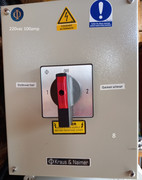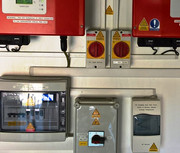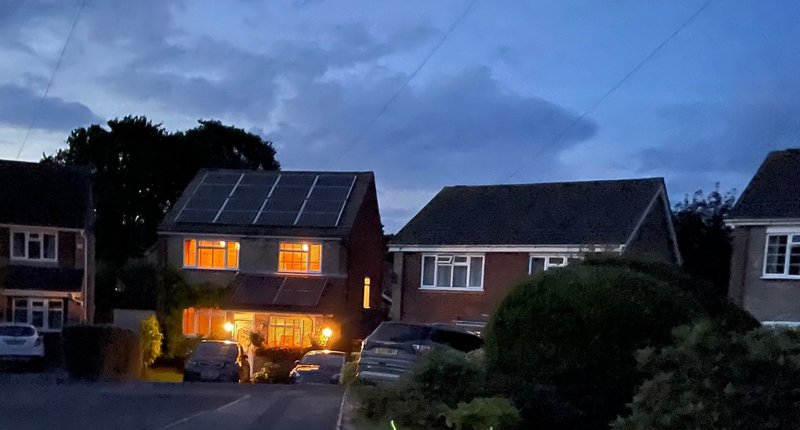We are, look at the US and continental Europe and sockets in bathrooms next to sinks. Anyone even suggesting doing this in the UK is banished, unless the socket is outside the bathroom next to the door - then it’s OK, despite the fact the hairdryer lead can still reach to the sink!Oldgreybeard wrote: ↑Tue Nov 08, 2022 9:36 pmExcept for the case mentioned where the manufacturer specifically prohibits having a N to PE bond in EPS mode, perhaps. Hard to see why they should be concerned about this, given that such a bond will be there when not in EPS mode, via the grid connection, but if the manufacturer has stated that it shouldn't be done then I think we need to assume they have a good reason for stating this.
Seamless switching, or a continuously available EPS supply like the hybrid Sofar models, seems a better arrangement, but doesn't necessarily solve the issue of making the thing TN-S when in EPS mode. Frankly, I'd not lose any sleep over having an IT emergency back up, as long as it had RCD protection and earth provided via a local earth electrode.
I think we can get VERY hung up on UK regs that have evolved independently of regs and methods in other countries, and often we seem to have an almost "ruling empire" view that the ONLY safe approach is ours, and that all other systems, regardless of their track record in the countries in which they are used, are inferior.
Island Mode N-E Bond Relay, How do inverters manage this?
-
vantech2022
- Posts: 31
- Joined: Thu Sep 15, 2022 2:00 pm
Re: Island Mode N-E Bond Relay, How do inverters manage this?
-
Oldgreybeard
- Posts: 1873
- Joined: Thu Sep 09, 2021 3:42 pm
- Location: North East Dorset
Re: Island Mode N-E Bond Relay, How do inverters manage this?
An example that sticks in my mind is helping a friend renovate a house in France. The electrician ran cables diagonally across walls, taking the shortest route from point to point, nothing like the UK obsession with only running cables in designated "safe zones", vertically or horizontally. The most bizarre UK habit is the really daft, and potentially unsafe, idea of using ring mains. Barking mad concept that should have been binned decades ago, I don't think any other country uses such a daft arrangement for power outlets.vantech2022 wrote: ↑Tue Nov 08, 2022 9:46 pm We are, look at the US and continental Europe and sockets in bathrooms next to sinks. Anyone even suggesting doing this in the UK is banished, unless the socket is outside the bathroom next to the door - then it’s OK, despite the fact the hairdryer lead can still reach to the sink!
25 off 250W Perlight solar panels, installed 2014, with a 6kW PowerOne inverter, about 6,000kWh/year generated
6 off Pylontech US3000C batteries, with a Sofar ME3000SP inverter
6 off Pylontech US3000C batteries, with a Sofar ME3000SP inverter
Re: Island Mode N-E Bond Relay, How do inverters manage this?
Single appliances on floating is not as much of an issue as installation with multiple appliances.
So as always it will be an engineering decision as to what to do, a few lights and limited sockets labeled up is very different from a completely uninformed user using everything as usual.
Manufacturer needs to work on the N-E advice, not unusual for larger UPS and larger installs to have multiple places where N-E is bonded as required. Probably pushing the comparison there.
In any case you'll get random results from whoever installed it anyway. Imagine getting this done on the cheap. I mean we still have loads of people who don't know they are IT because their earth bond water pipes been replaced by plastic.
I can see the product reasoning though, you've added 16A of UPS for "free" to your product - why do anything else more complicated just for the UK - any noted improvements can go into the next yearz bigger and better product.
So as always it will be an engineering decision as to what to do, a few lights and limited sockets labeled up is very different from a completely uninformed user using everything as usual.
Manufacturer needs to work on the N-E advice, not unusual for larger UPS and larger installs to have multiple places where N-E is bonded as required. Probably pushing the comparison there.
In any case you'll get random results from whoever installed it anyway. Imagine getting this done on the cheap. I mean we still have loads of people who don't know they are IT because their earth bond water pipes been replaced by plastic.
I can see the product reasoning though, you've added 16A of UPS for "free" to your product - why do anything else more complicated just for the UK - any noted improvements can go into the next yearz bigger and better product.
Re: Island Mode N-E Bond Relay, How do inverters manage this?
As I thought some of the product range is not rated for 62040.
SMILE-B3 RESIDENTIAL SERIES is.
SMILE-B3-PLUS RESIDENTIAL SERIES is not.
SMILE-B3 RESIDENTIAL SERIES is.
SMILE-B3-PLUS RESIDENTIAL SERIES is not.
-
vantech2022
- Posts: 31
- Joined: Thu Sep 15, 2022 2:00 pm
Re: Island Mode N-E Bond Relay, How do inverters manage this?
A couple of lighting circuits (fixed, cannot be adjusted) and a socket outlet IMO has to be OK. If the UPS goes into backup mode, any fault present beforehand would have tripped on grid supply. We are taking specifically about faults occurring during backup operation.Swwils wrote: ↑Tue Nov 08, 2022 9:55 pm Single appliances on floating is not as much of an issue as installation with multiple appliances.
So as always it will be an engineering decision as to what to do, a few lights and limited sockets labeled up is very different from a completely uninformed user using everything as usual.
Manufacturer needs to work on the N-E advice, not unusual for larger UPS and larger installs to have multiple places where N-E is bonded as required. Probably pushing the comparison there.
In any case you'll get random results from whoever installed it anyway. Imagine getting this done on the cheap. I mean we still have loads of people who don't know they are IT because their earth bond water pipes been replaced by plastic.
I can see the product reasoning though, you've added 16A of UPS for "free" to your product - why do anything else more complicated just for the UK - any noted improvements can go into the next yearz bigger and better product.
A system that is in grid mode 99% of the time would have to be quite unlucky to experience fault the 1% of the time it’s in backup mode.
Re: Island Mode N-E Bond Relay, How do inverters manage this?
You can imagine the scenario where the only one with power and zero information about the system wheels out extension leads to neighborhood though.
Maybe I have lost faith in humanity too much.
Maybe I have lost faith in humanity too much.
-
vantech2022
- Posts: 31
- Joined: Thu Sep 15, 2022 2:00 pm
Re: Island Mode N-E Bond Relay, How do inverters manage this?
For a charge, considering current prices for energy this could prove to be quite a lucrative approach!
Re: Island Mode N-E Bond Relay, How do inverters manage this?
19.6kW PV > 117MWh generated
Ripple 6.6kW Wind + 4.5kW PV > 34MWh generated
7 Other RE Coop's
105kWh EV storage
90kWh Home battery storage
40kWh Thermal storage
GSHP + A2A HP's
Rain water use > 530 m3
Ripple 6.6kW Wind + 4.5kW PV > 34MWh generated
7 Other RE Coop's
105kWh EV storage
90kWh Home battery storage
40kWh Thermal storage
GSHP + A2A HP's
Rain water use > 530 m3
-
ClockmanFRA
- Posts: 132
- Joined: Sat Dec 04, 2021 11:04 am
- Location: Normandy, France.
- Contact:
Re: Island Mode N-E Bond Relay, How do inverters manage this?
Okay chaps i thought you might be interested, here is my penny worth.
My Observations.
As a big inverter designer/ maker i ask the builders to Earth with the TT system as this is most common throughout the World.
Also, most folk that install OzInverters around the World do not have neutral busbars as each consumer unit circuit has double pole MCB's on all circuits.
I have had serious discussions with some real smart cookies, electrical engineers, around the World about Earthing and below is the conclusion.
On the 48vdc to 230ac Inverter designated Neutral 230vac output, a fully insulated Earth cable is connected permanently to a 2m long, in the ground, (first 200mm into the ground is also insulated), earth rod at no longer than 4 meters away from the Inverter. (Debates still rage if the Earth bonding to Neutral is after the Inverter output RCD or before it). The main consumer unit should not be bonded neutral earth and the Earth should be another 2m long earth rod in the ground for all earth connections for that consumer unit, and at least 4 meters away from the Inverter neutral Earth rod. Note 16mm/2 is normally used for the main inverter Earth cable.
Your Inverter is creating the 230vac, is a small power station, so to protect your humans a Earth should be installed at the Power station.
If you have PME and other wonderful barmy earth systems then get a L, N, and E changeover switch on the main feed from your Inverter and the utilities supply, ensure you have a centre OFF position, so ensuring complete isolation of supply circuits to your consumer unit for the individual circuits. Yea, there are automatic change over switches but ensure the change over time is suffecient for all three switches that none clash.
Note, there are issues with cheap Chinese PSU that use a half wave concept supply, as it sets up an imbalance on the 230v supply and sometimes trips the RCD at the power station but not the RCD at the Consumer unit.
Earthing for commercially manufactured main power Inverters is one hell of a subject, and most will not explain all the Earthing techniques for all systems of Earthing.
Please do not use any of the above discussion as approved by any regulatory body.


My Observations.
As a big inverter designer/ maker i ask the builders to Earth with the TT system as this is most common throughout the World.
Also, most folk that install OzInverters around the World do not have neutral busbars as each consumer unit circuit has double pole MCB's on all circuits.
I have had serious discussions with some real smart cookies, electrical engineers, around the World about Earthing and below is the conclusion.
On the 48vdc to 230ac Inverter designated Neutral 230vac output, a fully insulated Earth cable is connected permanently to a 2m long, in the ground, (first 200mm into the ground is also insulated), earth rod at no longer than 4 meters away from the Inverter. (Debates still rage if the Earth bonding to Neutral is after the Inverter output RCD or before it). The main consumer unit should not be bonded neutral earth and the Earth should be another 2m long earth rod in the ground for all earth connections for that consumer unit, and at least 4 meters away from the Inverter neutral Earth rod. Note 16mm/2 is normally used for the main inverter Earth cable.
Your Inverter is creating the 230vac, is a small power station, so to protect your humans a Earth should be installed at the Power station.
If you have PME and other wonderful barmy earth systems then get a L, N, and E changeover switch on the main feed from your Inverter and the utilities supply, ensure you have a centre OFF position, so ensuring complete isolation of supply circuits to your consumer unit for the individual circuits. Yea, there are automatic change over switches but ensure the change over time is suffecient for all three switches that none clash.
Note, there are issues with cheap Chinese PSU that use a half wave concept supply, as it sets up an imbalance on the 230v supply and sometimes trips the RCD at the power station but not the RCD at the Consumer unit.
Earthing for commercially manufactured main power Inverters is one hell of a subject, and most will not explain all the Earthing techniques for all systems of Earthing.
Please do not use any of the above discussion as approved by any regulatory body.


Re: Island Mode N-E Bond Relay, How do inverters manage this?
Middle OFF seems very sensible to me and I don't like those 4 module changeovers with no mid position.
